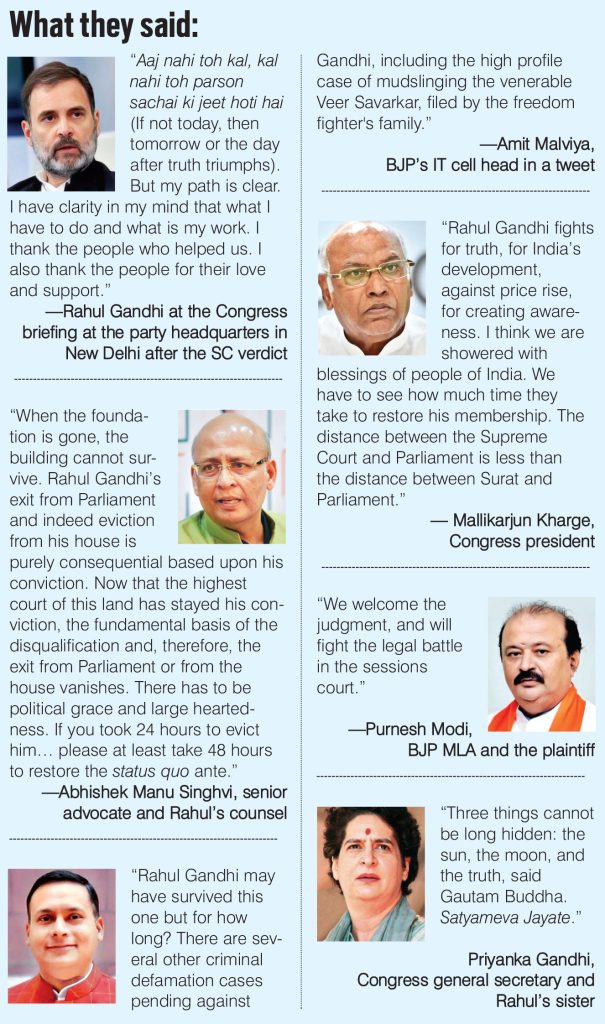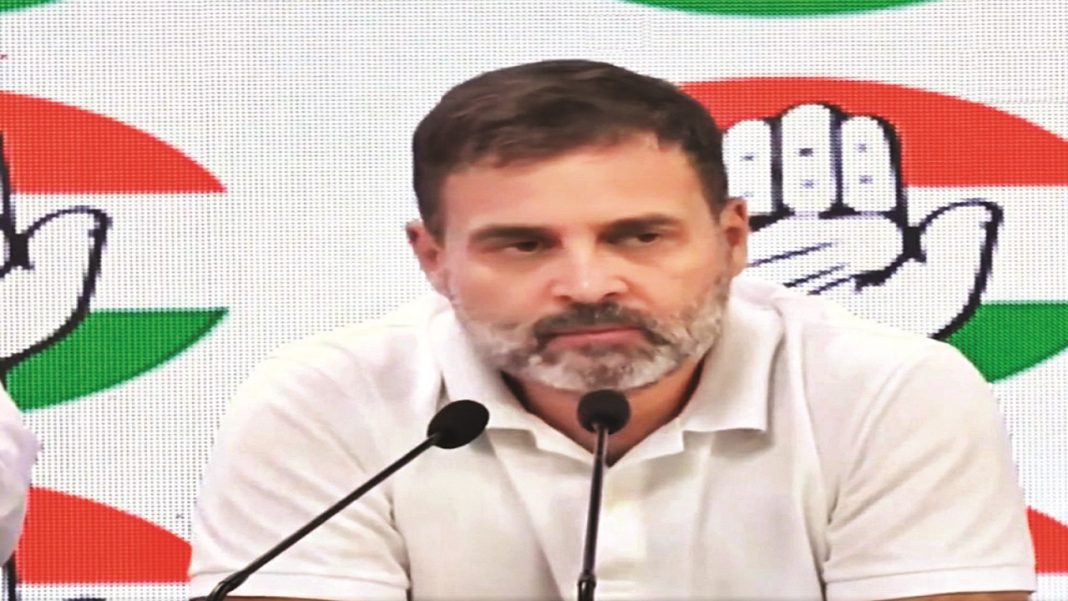By Sujit Bhar
Rahul Gandhi’s two-year sentence, passed by a trial court in Surat on a defamation case, was, as expected, stayed on August 4 by a Supreme Court bench of Justices BR Gavai, PS Narasimha and PV Sanjay Kumar. The stay is for the entire duration of the pendency of the case.
This order immediately puts Rahul back as an MP (from Wayanad), though whether he will be able to attend Parliament during the no-confidence motion deliberations on August 8, 9 and 10 will depend on when Speaker Om Birla allows the Lok Sabha Secretariat’s notice to take effect.
Congress MP Adhir Ranjan Chowdhury has already appealed to the Speaker to allow Rahul back into Parliament. Rahul was disbarred from Parliament in a day after his conviction in March. Now, the Congress wants him to be allowed back with the same alacrity.

One has to remember that Rahul has not been exonerated. The Supreme Court order merely stayed the sentencing on the conviction, and it is likely that the strange maximum sentence of two years—a clause that robbed him of his seat in Parliament—may be reduced when the case goes back to the Surat court.
The Surat magistrate court had found Rahul guilty of criminal defamation in a complaint filed by Surat West MLA Purnesh Modi of the BJP who objected to his remarks in Kolar (a place 100 km from Bengaluru) in April 2019—in the run-up to the Lok Sabha elections—about thieves with the Modi surname.
While passing the order, the apex court bench said that the trial court in Surat had not given reasons for awarding the maximum punishment in the criminal defamation case over his remarks. The top court found instances of non-application of mind in the two lower courts’ decisions, but at the same time noted that Rahul’s remarks were “no doubt… in bad taste” and that the Congress leader should “have been more careful while making the public speech.”
The Supreme Court also noted that it was because of the (maximum) sentence of two years imposed by the trial judge that “the provisions of sub-section (3) of Section 8 of the Representation of the People Act, 1950… have come into play. Had the sentence been even a day lesser, the provisions of sub-section (3) of Section 8 of the Act would not have been attracted.”
That was the problem. The top court commented that “when an offence is non-cognisable, bailable and compoundable, the least that the trial judge was expected to do was to give some reasons as to why, in the facts and circumstances, he found it necessary to impose the maximum sentence of two years.” The Supreme Court bench added: “…though the learned appellate court and the learned high court have spent voluminous pages while rejecting the application for stay of conviction, these aspects have not even been touched in their orders.”
The case had come up to the Supreme Court as a challenge to the Gujarat High Court order declining to stay the conviction.
Interestingly, in an interview later, Senior Advocate Mahesh Jethmalani, who had appeared for Purnesh Modi, accepted that the two-year sentence was a tad too harsh and was not justified. When he returns to the trial court for hearings, he would probably bear this in mind.
Affects the right of the electorate
While staying the sentence, the apex court made a very interesting observations. The bench said that Rahul’s disqualification would “not only affect the right of the appellant to continue in public life but also affect the right of the electorate, who have elected him, to represent their constituency.”
The question is whether the nature of this judgment affects the politics of Rahul Gandhi. It has to be remembered that Rahul has steadfastly refused to apologise for his remarks, and hence some manner of legal inconvenience does await him. Speaking later, Rahul said that he was sure that truth had to prevail and that there was “clarity” in his mind as to what his work is and would be. He has stated that his fight was to save the idea of India and to save the Constitution.
The politics of it all
That moves the issue from the legal arena to politics. While the Congress is in triumphant mood over the stay order in favour of Rahul, the intricacies of politics dictate that this in no way should change the modus operandi that the opposition unity of INDIA has decided to adopt during the no-confidence motion. Manipur is a national issue, and Rahul’s possible presence in Parliament should not let the alliance deviate from the target.
If one understands the BJP mindset in this, it was probably to just harass Rahul Gandhi and push him into a corner, because the ruling dispensation was pretty sure about the outcome of the appeal in the top court.
Probably the mistake Congress would make would be to pit Rahul Gandhi directly against Prime Minister Narendra Modi and make it a Rahul-Modi fight instead of showing a combined front. In the world of brand value, despite the super success of Rahul Gandhi’s Bharat Jodo Yatra, the Narendra Modi name stands head and shoulders above the Congress leader. The NDA’s fear is of a united opposition, not of Congress, or of Rahul Gandhi.
If one looks back at the numbers and the situational gain, Rahul’s activities, even while he was a disqualified MP, did affect the NDA. His harping on the Adani issue has had some effect, and Rahul would, frankly, not be able to use his position as MP any better than he already has.
His travel to Manipur, where he met both Meitei and Kuki people, also seems to have had a lasting effect. He was on a two-day visit to the state. If Rahul is present in Parliament during the no-confidence motion, his first hand experiences would come in handy.
It is only in the long run, when the general elections are at hand, would Rahul’s status as an MP be in demand. At this point, one should expect this “victory” to rest as a motivational boost for the Congress and the Opposition.


